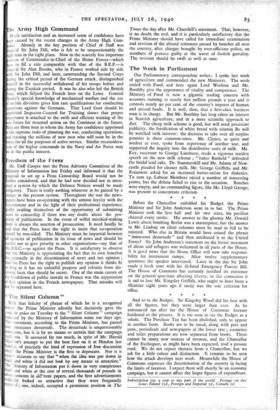reedom of the Press
Mr. Duff Cooper met the Press Advisory Committee of the linistry of Information last Friday and informed it that the roposal to set up a Press Censorship Board would not be urther considered, and that he had now decided not to intro- uce a system by which the Defence Notices would be made bligatory. There is really nothing whatever to be gained by a iange in the present system. Throughout the war the news- apers have been ea-operating with the utmost loyalty with the overnment and in the light of their professional experience, adly availing themselves of the opportunity of submitting ews to censorship if there was any doubt about the pro- riety of publication. In the event of wilful mischief-making ere is always the sanction of prosecution. It need hardly be id that the Press have the right to insist that co-operation hould be two-sided. The Ministry must be impartial between 11 agencies of publication in its issue of news and should be areful not to give priority to other organisations—say that of e B.B.C.—as against the Press. It is satisfactory to observe the Ministry is appreciating the fact that its own function es primarily in the dissemination of news and not opinion ; at the Press has the right to publish any opinion it thinks fit o long as it has no unlawful purpose and refrains from -dis- losing facts that should be secret. One of the main causes of e breakdown of public morale in France was the suppression f free opinion in the French newspapers. That mistake will ot be repeated here.






























 Previous page
Previous page